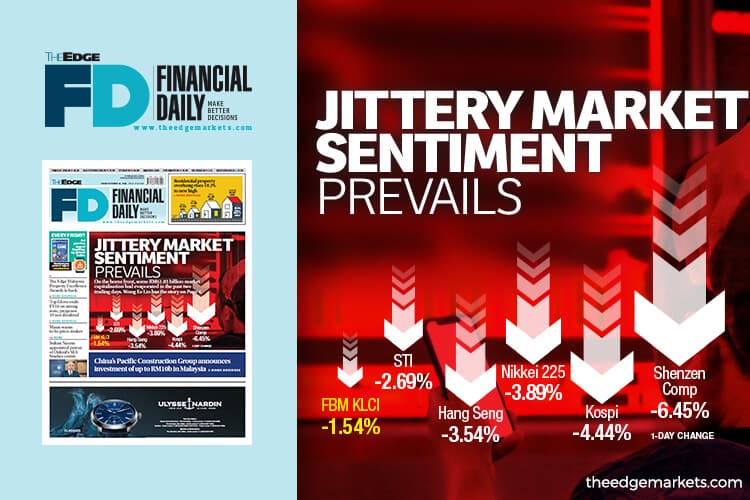
This article first appeared in The Edge Financial Daily on October 12, 2018
KUALA LUMPUR: The US market once again has taken the centre stage leading the global trend.
Asian markets caught the cold yesterday after an overnight sharp 831.83-point fall on Wall Street on Wednesday. Whether the Asian markets will regain their foothold today will largely be dependent on the overnight performance of the Dow Jones Industrial Average (the Dow) and S&P 500 Index, said analysts.
As at press time, the Dow had dropped 276.88 points, or 1.08%, to 25,321.86 points less than two hours after the opening bell, while the S&P 500 had lost 25.72 points, or 0.92%, to 2,759.72 points.
The renewed concerns about the nearly 10-year upcycle in the US market could be due for a major correction sparked by a heavy selldown in most Asian bourses, including Bursa Malaysia, yesterday. The expectation of three to four interest rate hikes in the US, given its strong economic data, has also diverted more investment money away from the region.
On the home front, some RM61.03 billion market capitalisation had evaporated in the past two trading days, while the FBM KLCI had tumbled 65.66 points or 3.7%.
The benchmark index regained some lost ground yesterday, closing at 1,708.49 points, higher than its day’s low of 1,683.7 points.
Expectations of the government introducing new taxes have also dampened the sentiment as uncertainties arise.
The lack of buying impetus added to the selling pressure on Bursa as corporate earnings had been disappointing for the quarter ended Sept 30.
Nevertheless, it is noteworthy that the KLCI was one of the better performers in the region (see chart).
Equity fund managers and analysts expected the sentiment to remain jittery in the near term while some markets are expected to see technical rebounds after the sharp fall.
The KLCI, which fell as much 52.2 points yesterday morning, rebounded at the 11th hour as local institutional funds hunted for bargains lending support to share prices, said Phillip Capital Management Sdn Bhd chief investment officer Ang Kok Heng.
“Malaysia recovered a bit towards the end as Malaysia has always been well supported by investors, especially [the] EPF (Employees Provident Fund) and PNB (Permodalan Nasional Bhd) as they are long-term investors anyway,” said Ang.
Ang explained that when there is a sharp correction in the market, there should usually be a rebound because people want to take opportunities to buy. “I think most likely we will see the market (KLCI) stabilising. It may not go up a lot, but it may be sideways, or only slightly higher,” said Ang.
Areca Capital Sdn Bhd chief executive officer Danny Wong Teck Meng commented that the lack of short-term catalysts, but more of risks such as policy clarities and the upcoming Budget 2019 did not help.
Wong said the market now is in a “very volatile situation” driven by the weak sentiment and the current highly liquid market.
“I think the markets are due for a correction especially in the US. To me, it’s overdue for correction because while the US interest rates and US bond yield rise, the equity market has been going up,” said Wong, explaining that the equity market usually reacts negatively.
“In the short term, it will be a very volatile situation, but over the longer term, I think the US market is overvalued,” said Wong.
TA Securities technical analyst Steven Soo said he noticed active short selling in the local market of late. “I am seeing significant short-selling volume interest in Sapura Energy Bhd, Hibiscus Petroleum Bhd, MyEG Services Bhd and Gamuda Bhd today (yesterday),” he added.
Going forward, Soo said investors will be closely monitoring the contents of the upcoming Budget 2019.
“While these stocks have been punished, I believe that buying opportunities would present because the selling is a bit overdone. It is also very obvious that foreign selling is involved,” said Soo, noting that the intraday short-selling volume was significantly high.
“On whether the FBM KLCI is overvalued, I believe that 1,800 points is a long-term average of about five to 10 years,” Wong added.